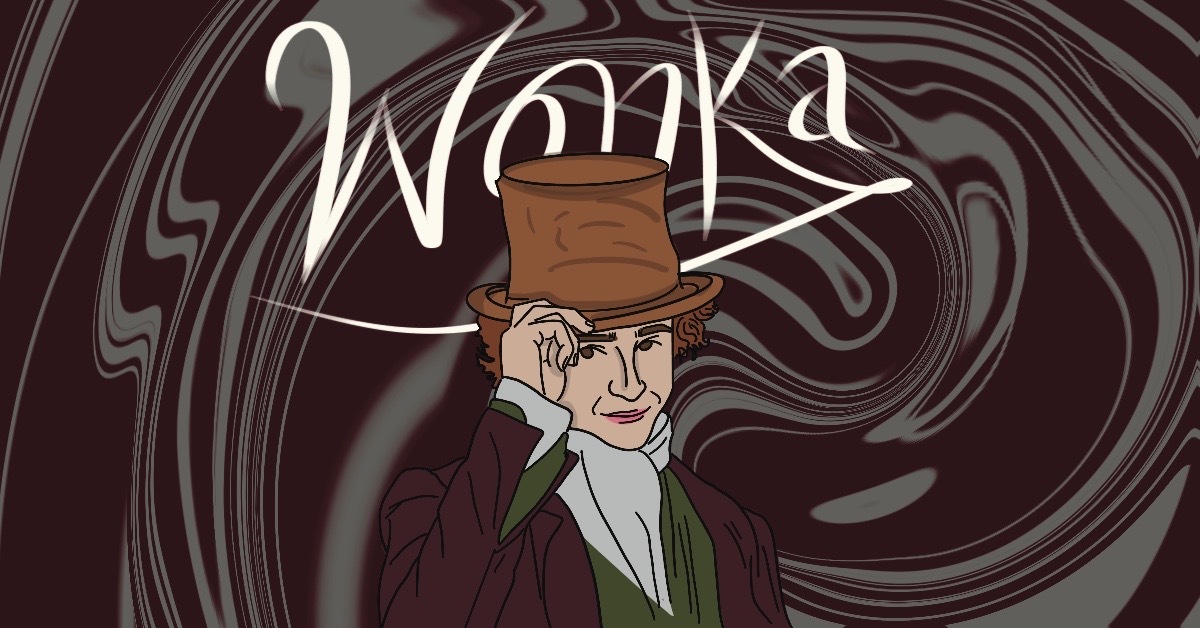Wonka: an overly earnest, but fun-spirited musical adaptation
The latest rendition of the classic chocolatier captures just enough of the source material’s whimsical absurdity without relying on Roald Dahl’s more problematic tropes.
Of all the classic figures in children’s literature, perhaps the most eccentric, ambiguous, and morally criticized is Willy Wonka. The chocolatier was first introduced in Roald Dahl’s 1964 novel Charlie and the Chocolate Factory. In it, five children, including the humble, good-natured Charlie, are the lucky winners of tickets to tour the chocolate factory alongside Wonka. One is swept away by a chocolate river, another is blown up into a giant blueberry, the third is attacked by squirrels, and the fourth is shrunk to the size of an ant, leaving only Charlie behind. He’s then declared fit to own and run the factory, and the tour is revealed to have been a test all along. It’s a narrative that has been read in schools time and time again, and Wonka’s proclivity for torturing children—though never killing them—is now regarded as concerning, to say the least. But before stepping into his sadism and child abuse, who exactly is Willy Wonka?
According to director Paul King’s new take, Wonka, the titular character spent his youth scraping together coins and dreaming of opening his own chocolate shop. In a host of promotional spectacles, he puts his skills as a magician and inventor to use, garnering attention from the public eye and other envious chocolatiers.
Timothée Chalamet’s performance recalls little of the cunning quirkiness seen in previous renditions. His portrayal is earnest and optimistic; perhaps at times a little eye-roll worthy. Any fan of Chalamet’s work knows that he’s more accustomed to gritty, realistic roles, and the transition from conflicted youth to jaunty showman seems just as jarring for him as it does for audiences. His delivery is overly expressive and laced with cringe-inducing sincerity. With every raised eyebrow and half-baked exclamation, you can tell just how hard he’s trying to make it work, and that’s the problem—the whole endeavour just feels so effortful for him.
Then comes the issue of his singing. This film is chock-full of spontaneous belting and large-scale dance sequences, and Chalamet just doesn’t have a powerful enough voice to carry the musical numbers. But thanks to stunning visuals and absorbing choreography, he doesn’t have to. The dancing is energetic and the tunes, composed by Joby Talbot and Neil Hannon, are catchy enough that they never feel ill-placed or drawn out. Every now and then the screen will burst into a bizarre array of song and colour, and in those fever dream moments, Dahl’s elements of absurdity and boundless imagination really shine through.
Nathan Crowley’s production design is delightful: bright and lavish in moments of grandeur, mellow and cozy for more heartwarming interactions. The city in which the film takes place is geographically ambiguous, and somewhat confusingly so, given the occasional mention of real-world locations. Nonetheless, the setting is immersive enough to distract viewers from this puzzle. With its cobblestoned streets, rich velvet costumes, and shiny steampunk technology, it feels the way a family-friendly fantasy world should be: fully realized without being overstuffed.
The film’s antagonists are another strong point. The wicked trio at the centre of the plot’s conflict is composed of Slugworth, Prodnose, and Fickelbruger, played by Paterson Joseph, Matt Lucas, and Mathew Baynton, respectively. Together, they go to horrifying lengths to prevent Wonka from kick-starting his chocolate business. Everything from their ridiculous names to their pompous attires is reminiscent of typical Dahl villains. Whereas less-skilled performers would’ve made their overtly contemptuous dialogue sound campy, these three embody their roles with enough conviction that the effect is nostalgic rather than tiresome. Get ready to suspend your cynicism and embrace the on-the-nose villain dialogue with your whole inner child.
Another performer that stands out is Calah Lane, who plays Wonka’s young accomplice and eventual friend, Noodle. With a down-to-earth demeanour, she’s easily the most likeable character in the film. Opposite Chalamet’s well-meaning but naïve Willy, her practicality is grounded and refreshing.
But beneath the charming visuals and sincere performances, a nagging question remains: how did Wonka transform from this innocent, benevolent youth into the problematic figure seen in the novel? Dahl’s story depicts a man who manipulates children to further his business goals, and it’s difficult to imagine Chalamet’s kind-hearted version indulging in such horrific behaviour. The shift is never addressed, and it’s puzzling how the film glazes over this glaring issue from the book rather than truly addressing it.
Better handled in this film is the matter of the Oompa Loompas. In the novel, they’re depicted as mischievous, primitive factory workers, paid for their labour in cocoa beans. While they’re supposedly happy with this situation, it’s problematic to create a group whose questionable ideals regarding fair wages and working conditions conveniently fit the ambitious goals of their employer. Wonka makes a positive update to this dynamic: the relationship between Lofty, an Oompa Loompa played by Hugh Grant, and Willy is more collaborative than exploitative. Additionally, the creation of the chocolate factory itself comes about through magic, thus dismissing the source material’s issue of taxing manual labour.
Despite the novel’s issues and Chalamet’s awkward performance, Wonka is sure to charm audiences. It’s whimsical and imaginative; sweet but never sickly so. With its outlandish characters, vibrant colors, and spirited tone, Wonka stands out as a breezy heartfelt spectacle for the whole family.

